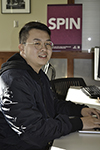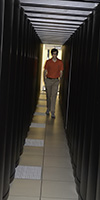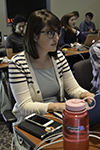Stories about... Blue Waters
 SPIN Introduces Shelana Martin to Cybersecurity and the Open Source Platform, Moodle
SPIN Introduces Shelana Martin to Cybersecurity and the Open Source Platform, Moodle
September 4, 2018
How did Shelana Martin, who’s not a computer science major, end up in an NCSA internship? The rising senior in education technology under the College of Education’s Learning and Education Studies program was part of NCSA’s SPIN (Students Pushing Innovation) internship program. SPIN fosters interdisciplinary collaboration, encouraging Illinois undergraduate students, and not just computer science students, to do challenging research related to cutting-edge new technology. The new technology Martin learned was Moodle, an open-source learning management system. Plus she also learned quite a bit about cybersecurity too.
 NCSA’s New CIP Internship Program Trains Cyberinfrastructure Professionals
NCSA’s New CIP Internship Program Trains Cyberinfrastructure Professionals
December 12, 2017
According to NCSA’s Daniel Lapine, the number of qualified people who have experience working in advanced cyber-infrastructure (CI) is rather limited. So over the next three years, he and some folks at NCSA hope to do something about it. As part of the NSF-funded CyberTraining CIP: NCSA Internship Program for CI Professionals, they are seeking to add to the nation’s pool of qualified, advanced cyberinfrastructure professionals.
 NCSA’s SPIN Program Exposes Illinois Students to Innovative, High-Tech Research
NCSA’s SPIN Program Exposes Illinois Students to Innovative, High-Tech Research
November 30, 2017
Illinois undergraduate students seeking to do challenging research on campus, especially related to cutting-edge new technology, need look no further than NCSA’s SPIN (Students Pushing Innovation) program. Begun in 2012, it was created to support undergraduate research on campus and also to provide access to new technology—high-performance computing, data analysis and visualization, or cybersecurity, to name several. The gist of the program? Students get to do cutting-edge research in new technologies mentored by world-class researchers— possibly using NCSA’s Blue Waters supercomputer.
 During I-STEM Camp’s NCSA Day, UHS Students Experience Data Visualization, Super Computers, and NCSA’s Research
During I-STEM Camp’s NCSA Day, UHS Students Experience Data Visualization, Super Computers, and NCSA’s Research
October 17, 2017
Where’s the Popcorn? That was all that was missing when 27 Urbana High School (UHS) student athletes sporting 3D glasses lounged in the cushy, theater-quality seats of NCSA’s viewing room to preview some of the Advanced Visualization Laboratory’s (AVL) high-resolution, cinematic-quality, 3D data visualizations. They were at the National Center for Supercomputing Applications for NCSA Day, the final day of the first-ever, I-STEM Summer Camp: A Multidisciplinary Program. During the Friday, August 18th visit, students also toured the National Petascale Computing Facility and met the Blue Waters Super Computer up close, and also discovered more about what NCSA does while attending a panel discussion hosted by several NCSA researchers and programmers.
 At Blue Waters Institute, Students Use Parallel Computing, Super Computers, to Speed Up Research
At Blue Waters Institute, Students Use Parallel Computing, Super Computers, to Speed Up Research
June 28, 2017
With the goal of learning High-Performance Computing (HPC), 26 students were on campus from May 29th through June 9th as part of the 2017 Blue Waters Institute. While some were graduate students from the XSEDE project, 18 were undergraduate Blue Waters Interns. Not only did these interns spend two weeks learning about parallel computing, but over the next year, they will continue to use their newly acquired HPC skills—and the Blue Waters Super Computer—to analyze data for their Blue Waters research projects back at their home institutions.
FULL STORY
 Students Acquire High-Performance Computing Skills During Blue Waters' Petascale Institute
Students Acquire High-Performance Computing Skills During Blue Waters' Petascale Institute
June 20, 2016
NCSA (the National Center for Supercomputing Applications) is changing the millennial generation and the future of big data with the Petascale Insititute. During the two-week institute, students go from knowing fairly nothing about HPC (High-Performance Computing) language to knowing enough to complete amazing research projects using the Blue Waters supercomputer. From May 22nd to June 3rd, 19 Blue Waters interns (undergraduate students), 10 XSEDE scholars (both undergraduate and graduate students), and four additional undergraduate and graduate students participated in the institute. While Blue Water interns will be working on their research projects from May of this year through May of 2017, XSEDE scholars have a condensed schedule where they’ll be finished with their projects by the end of August 2016.
FULL STORY
 Petascale Institute Introduces Students to High-Performance Computing
Petascale Institute Introduces Students to High-Performance Computing
June 12, 2015
Most of the 34 students who attended the two-week Petascale Institute May 24th–June 5th are not in computer science; however, by the middle of the second week, they were glibly rattling off HPC (High Performance Computing) jargon, confidently referring to concepts most of us have either never heard of or have no idea what they actually are, like: OpenMP and MPI, vector accelerators, OpenACC, CUDA, debugging, optimization, and visualization. Their goal? To learn enough about parallel computing to be able to use Blue Waters or another supercomputer to analyze data for projects ranging from studying black holes, neutron stars, and galaxies, to natural language acquisition, visualization in cyber security, or protein folding using molecular dynamic simulations.
FULL STORY
 Interns Have an Up-Close-and-Personal Encounter With Blue Waters
Interns Have an Up-Close-and-Personal Encounter With Blue Waters
June 24, 2014
Ever want to take a super-computer for a spin? Recently, the 21 students from around the country who participate in the Blue Waters Student Internship Program recently got to do just that. After being exposed to HPC (High-Performance Computing), including learning some parallel programming—the language of supercomputers—the interns got to run their program on the University of Illinois' Blue Waters, one of the most powerful supercomputers in the world and the fastest on a university campus.
FULL STORY













.jpg)
















